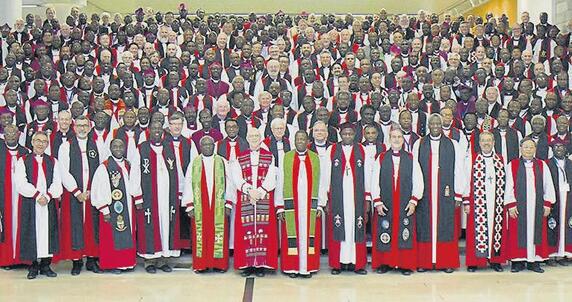Where now for the Anglican Communion?
Covid-19 has prompted many thoughts about what life could look like now that we have been forced to abandon, for a while, uninterrupted global travel, foreign holidays, and despite the foreshortened lives and devastated economies, enjoyed with the earth and its airspace a sabbath of sabbaths.

Lambeth 2020 and GAFCON in 2020 postponed gatherings that would have signalled the continuing tear in the fabric of the Anglican Communion. Does this postponement and the pandemic crisis signal a possibility of different opposing groups in the Anglican Communion finding a way of remaining in one Communion both seeking and showing the unity Christ prayed for the church? Seeking the unity of the Church has always been a key commitment of the Anglican tradition. Might there be space for thoughts about what the Global Anglican Communion might look like?
[Editor’s note: see Stephen Noll’s response to this article below.]
Three groups
There are three distinct groups in the Anglican Communion. The Lambeth group under the Archbishop of Canterbury holds the historic status of leading the Communion. The Instruments of Communion, the Archbishop of Canterbury, the Lambeth Conference, the Primates Meeting and the Anglican Consultative Council (of bishops, clergy and lay people) facilitate its common life and are expected to maintain its unity. They have struggled with the challenges of unity in the light of the break in Communion between provinces that seek to maintain a biblical and historic view of marriage, which is still the teaching of the Communion, and those who have openly flouted this teaching.
The GAFCON group attempted to support the instruments of unity in restoring discipline on ethical and theological matters which they see as central to the identity and witness of the church. But they appear to have lost faith in the Lambeth group, in spite of the leadership of the current Archbishop of Canterbury who is recognised as orthodox in his theology.
The third group is the Global South group of Primates who take the same theological positions as GAFCON but believe that their group should continue to work with the instruments of the Anglican Communion, particularly the Lambeth Conference under the Archbishop of Canterbury.
We are often told that everything has changed in the light of Covid-19 and that we need to start with a clean slate in many areas. The Church of England has announced a commission, to be chaired by the next Archbishop of York, to examine its diocesan structures and use of buildings. A review has also been launched into the workings of the Anglican Communion Office to determine new operational priorities. The Secretary General, Dr Josiah Idowu Fearon, said: ‘It is clear that the assumptions and priorities of the past are not the assumptions and priorities of the future.’ The final report will be produced by the end of August.
Does this fresh start and clean slate apply to the Anglican Communion as a whole?
We believe it does. We suggest that each group does not remain rigidly in its legacy institutional positions, but begins to explore how staying together in one Communion may be achieved. If some feel that the point of no return passed a while ago, can they reflect again? If a group feels that conversation is futile as there is little possibility of staying together, they also need to think again.
Is there any way forward?
Might the future require a transition like that from the British Empire to the Commonwealth of Nations? In the latter, no longer do the politics and policies of the United Kingdom direct the policies and governance of up to 50 nations. The nations of the Commonwealth direct their own affairs, but maintain fellowship with one another based on historic and cultural ties embodied in the person of the British monarch.
Would such a model fit the Anglican Communion, whose member churches have always had links with the states they are in for principled and not solely pragmatic reasons, believing that their calling is to serve the common good and wider community?
What would these new relationships in the Anglican Communion look like? No one knows. It is not in the nature of negotiations to know.
The winds of the Holy Spirit are blowing many people into the Kingdom, particularly in Africa where GAFCON is based. The same Spirit can enable the church to discover and demonstrate a unity that will enhance its mission to draw more people to Christ.
Anglicans should pray fervently that its bishops and leaders are led at this time to address the need for unity in the Anglican Communion.
Canon Dr Vinay Samuel is a former General Secretary of EFAC and Canon Dr Chris Sugden is a trustee of EFAC. Both were involved in arranging the GAFCON 2008 Conference in Jerusalem.
The Editor comments: Gafcon has never accepted so-called Christian ‘unity’ in which biblical truth is optional, or ‘orthodoxy’ which does not oppose false teaching. Stephen Noll responds to and examines the idea proposed above of a “Commonwealth of Churches”, and describes it as “weak tea”.





